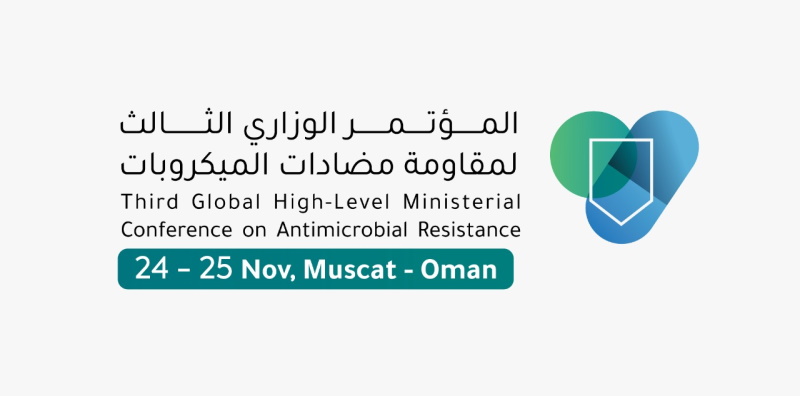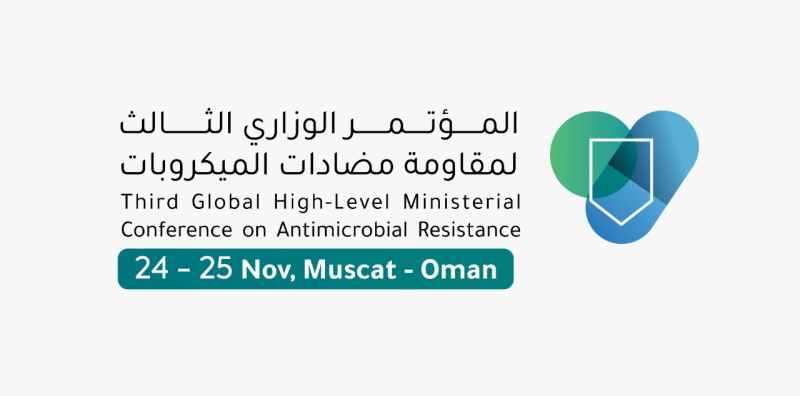
Sultanate of Oman to Host Third Global High-Level Ministerial Antimicrobial Resistance Conference Next Week
The Sultanate of Oman will host the 3rd Global High-level Ministerial Conference on Antimicrobial Resistance (AMR) at kempinski Hotel Muscat from 24 to 25 November.
The Conference is organized by the government of the Sultanate of Oman, represented by the Ministry of Health and Ministry of Agriculture, Fisheries and Water Resources in cooperation Gulf Health Council for the Cooperation Council States and with the Quadripartite Alliance formed by the United Nations to monitor the antibiotic resistance - World Health Organization (WHO), Food and Agriculture Organization of the United Nations (FAO), the World Organization for Animal Health (OIE), the United Nations Environment Programme (UNEP).

The third Conference builds on the success of the two previous Ministerial Conferences held in the Netherlands in 2014 and 2019, which the Sultanate of Oman participated in with a delegation headed by the Minister of Health and a representative from the Ministry of Agriculture, Fisheries and Water Resources.
The two conferences highlighted the collaborative work to tackle the risk of the spread of antibiotic resistance. During its active participation in these two conferences, the Sultanate of Oman expressed its desire to organize and host the 3rd conference, which was widely welcomed by the participating countries and organizations due to the Sultanate of Oman's reputation.
Conducting the event in the Sultanate of Oman represents a shift for the conference to include other regions beyond the European continent, exchange experiences, and benefit from the actions taken in those countries, which immensely helped to reduce the spread of antibiotic-resistant microbes and their adverse effects on the health and economy.
Given the importance of the event, the Sultanate of Oman has been preparing to organize and host this conference in coordination with countries, organizations, and relevant scientific bodies for approximately one year in order to provide constructive content and outcomes that serve as a fundamental addition in countering the risks of AMR locally, regionally, and globally.
In this regard, a supervisory committee has been formed that includes their Excellencies Ministers of Health, Agriculture, Fisheries, and Water Resources, and Information, as well the Chairman of the Environment Authority, Undersecretary of the Foreign Ministry for Diplomatic Affairs, MOH’s Undersecretary for Health Affairs, and AFWR’s Undersecretary for Agriculture. The committee supervises the Conference’s organization procedures, adopting the conference program and outcomes, communicating with the Ministers of the participating countries, and discussing details regarding the Muscat Manifesto as a core outcome of the Conference.
Moreover, the organizing committee of the Conference was formed with the chair of the Director General of Diseases Surveillance & Control in the Ministry of Health (MOH), along with representatives from MOH, AFWR, and Gulf Health Council. The organizing committee coordinated all related activities, developed the programs and outcomes, and shared them with Member States in the World Health Organization (WHO), the Food and Agriculture Organization of the United Nations (FAO), and other parties involved in the Conference. The committee also includes sub-teams that are concerned with the various organizational, administrative, and media matters.
The conference will be conducted through keynote speeches, case studies to demonstrate best practices, and interactive discussions between participants. It will be an opportunity for an interactive dialogue on One Health action to address the AMR issue.
Therefore, the theme of the Conference this year is "The AMR: from Policy to One Health Action", that aims to accelerate tackling the antimicrobial resistance at the national, regional, and global levels, as well as to enhance international cooperation.
Around (50) representatives from different countries are expected to take part in the Conference representing Human Health, Animal Health, and Environment. Moreover, the Directors General and Presidents of WHO, FAO, OIE, and UNEP are participating in the Conference. Renowned global experts representing health, animal, environment, economic, and agricultural aspects have also been invited.
Several objectives are to be achieved through this conference including promoting the importance of political commitment to the One Health approach in addressing the AMR issue; highlighting the role of the environment in the spread of AMR and the importance of surveillance and monitoring of both AMR and antimicrobial use across all three domains (humans, animals and the environment), sharing successful examples in implementing the whole-of-government and One Health approaches to mitigate the threat of AMR, as well providing opportunities for collaboration and partnership between countries and international organizations to address AMR in the context of the SDGs.
The issue of AMR has considerable attention on the local and international levels. Hence, the Conference represents a valuable opportunity to leverage global experiences and conceptualize and submit solutions to international organizations and the UN. The Conference aspires to progress from policymaking to framing action and governance indicators to proceeding at the national, regional, and global levels.
Key outcomes of the Conference include the Muscat Manifesto on accelerating One Health action on AMR to meet the 2030 SDGs targets and agree upon the proposed indicators for following up Antibiotic Consumption. It is hoped that the Muscat Manifesto will be submitted for discussion at the upcoming UN General Assembly High Level Meeting on AMR in 2024; recommendation on a global framework for a One Health surveillance system for AMR involving all aspects of the One Health; and secure the inclusion of AMR in the United Nation Sustainable Development Cooperation Framework.
AMR is a continuous concern that is making infections in humans and animals harder to treat. It threatens recent gains in key areas of global health, food security, economic growth, and development.
New estimates have identified 1.27 million deaths in 2019 from drug-resistant infections. Without action, by 2050 AMR could lead to a 3.8% reduction in annual gross domestic product (GDP) and push as many as 28 million people into poverty.
There has been some global progress in addressing AMR. In 2015, the Global Action Plan by the World Health Assembly was adopted and subsequently endorsed by the Food and Agriculture Organization of the United Nations (FAO) and the World Organization for Animal Health (OIE). The 2016 UN General Assembly (UNGA) Political Declaration has played critical role to galvanize political action to address AMR across sectors.
The World Bank Group predicts that by 2050, global livestock production will decline from at least 2.6% to 7.5% annually as a result of antimicrobial resistance. The World Economic Forum has classified antimicrobial resistance as a global threat that is beyond the ability of any organization or country to manage or mitigate on its own.
In 2019, the UN Secretary-General had called upon Member States to deliver the urgent support and investment needed to scale up AMR responses at national, regional, and global levels, recommending that AMR be included in the UN Sustainable Development Cooperation Framework. The Establishment of the AMR SDG indicators is a key milestone in recognizing the importance of monitoring AMR as part of the SDGs at national and global levels and catalyzing One Health action on AMR.
Most countries have now developed AMR National Action Plans (NAP). However, there are major challenges in funding, implementing, scaling up, and sustaining the full range of essential programmatic and effective interventions.
The COVID-19 pandemic, once again, demonstrates the key linkages between humans, animals and the environment. The pandemic has reiterated the importance of early investment in prevention, preparedness, and response towards hazards.



























